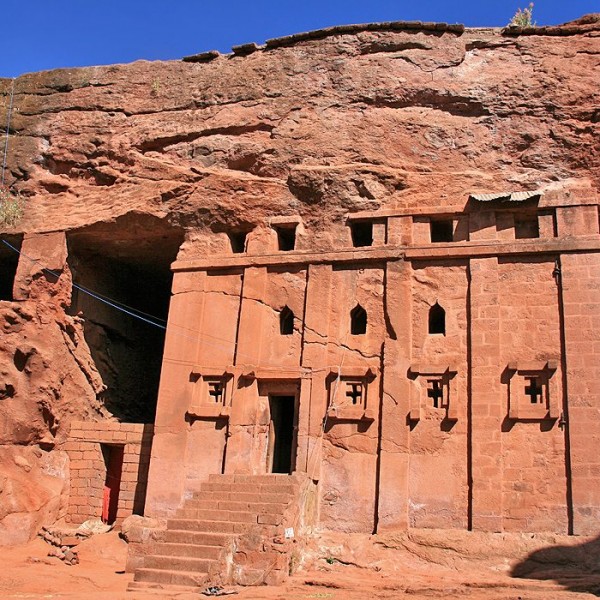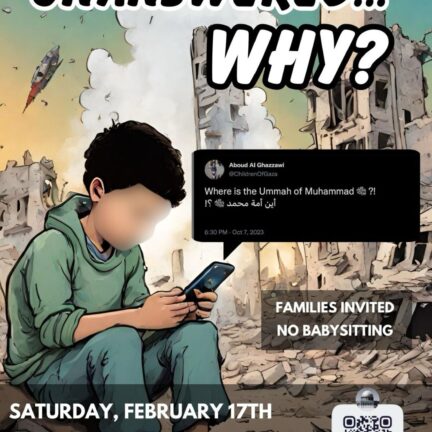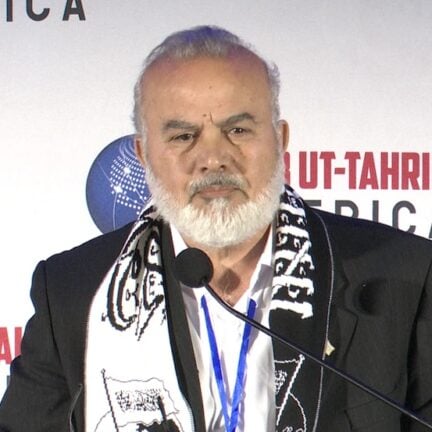Sahaba in Abyssinia

“Bedtime Stories” or Islamic Inspirations for Muslims in America?
“You have indeed in the Apostle of Allah a beautiful pattern of (conduct) for anyone whose hope is in Allah and the Final Day and who engages much in the praise of Allah” TMQ 33:21
Role of History in the Relevations
Since the advent of Islam, Muslims have been trained to use Islamic texts to extract both enlightenment and exhortation from the history of humanity. From the first Ayaat (verses) of al-Qur’an and related Ahadith (Prophetic narrations), Allah (swt) revealed numerous stories of the religious successes and failures of previous generations to The Prophet Muhammad (saw) that ranged from the offspring of Prophet Adam (as) through the successive generations to date (e.g., Jews, Egyptians, Thamud, Makkans, etc.). Allah (swt) corrected inaccuracies, provided elaborations, and offered new examples in human history as a means of reminding the current generation about the blessed rewards of obeying Allah (swt) as well as the grim punishments of disobeying Him (swt).
Bedtime Stories or Islamic Inspirations?
Far from “bedtime stories” to entertain children or casual tales for adult amusement, these divinely-inspired narratives of human history in the sacred Islamic texts have indeed instructed and inspired our Muslim Ummah (Nation) to this day. Stories of proper Islamic practices as illustrated by The Prophet (saw) and continued by his Companions (raa) have remained an integral part of Islamic culture and education for over 1300 years. This first generation of Muslims was divinely-decreed to be the “best generation” whose legacy would be collected, protected, and transmitted until the Day of Judgment. Both their monumental collective achievements and periodic individual errors continue serving as illustrations of the challenges of humans seeking to apply the Qur’anic teachings and emulate The Prophet’s (saw) example.Abyssinia: The Nobility of Islamic Faith and Firmness
During the middle of the 5th year of his Islamic Prophethood in Makkah, The Prophet (saw) and his Companions (raa) were being brutalized by the pervasive persecution of the Quraysh kuffar (disbelievers). In His (swt) Infinite Mercy, Allah (swt) revealed to The Prophet (saw) the permission for migration for any Companions (raa) who feared relinquishing their religion under the constant Quraysh oppression. Allah (swt) said in Surah az-Zumar:
“Say: “O ye my servants who believe! Fear your Lord: good is (the reward) for those who do good in this world. Spacious is Allah’s earth! Those who patiently persevere will truly receive a reward without measure!” TMQ 39:10.
This new location would be Abyssinia, which was ruled by the Christian King Negus who demonstrated no hostility toward the new religion of Islam or its adherents.
As the small group of Companions (raa) quietly settled into their new location, the Quraysh kuffar sent their most skilled politician and ambassador, Amr ibn al-‘As, helped by ‘Abdullah ibn Abi Rabi’a to disrupt their sanctuary and cause their “rendition” back to the Makkan government’s clutches. Amr tried to use anti-Islamic exaggerations and propaganda to incite King Negus against the new Muslim immigrants (raa) by claiming that the Muslims’ religion abandoned their forefathers’ traditions, rejected Christianity, and insulted Prophet Isa (as). An outraged King Negus immediately ordered all of the Muslims (raa) to appear in his court among all the Abyssinian military generals, religious bishops, and political leaders to answer Amr’s charges.
Although these Muslims (raa) were small in number, mainly young in age, without any protective economic and political resources, and separated from the leadership of The Prophet (saw), these Muslims (raa) decided among themselves that the best response to these charges was to openly and directly declare their Islamic faith and teachings. The brave response to King Negus in front of the King’s courtiers and Quraysh representatives was provided by Jafar ibn Abi Talib, who was selected by the Muslims to be their spokesman. Jafar (raa) told the King:
“O King, we were a people in a state of ignorance and immorality, worshipping idols and eating the flesh of dead animals, committing all sorts of abomination and shameful deeds, breaking the ties of kinship, treating guests badly, and the strong among us exploited the weak. We remained in this state until Allah sent us a Prophet, one of our own people, whose lineage, truthfulness, trustworthiness, and integrity were well-known to us.
He called us to worship Allah alone, and to renounce the stones and the idols which we and our ancestors used to worship besides Allah.
He commanded us to speak the truth, to honor our promises, to be kind to our relations, to be helpful to our neighbors, to cease all forbidden acts, to abstain from bloodshed, to avoid obscenities and false witness, and not to appropriate an orphan’s property nor slander chaste women.
He ordered us to worship Allah alone and not to associate anything with him, to uphold Salat, to give Zakaah, and fast in the month of Ramadan.
We believed in him and what he brought to us from Allah, and we follow him in what he has asked us to do and we keep away from what he forbade us from.
Thereupon, O King, our people attacked us, visited the severest punishment on us, to make us renounce our religion and take us back to the old immorality and the worship of idols.
They oppressed us, made life intolerable for us, and obstructed us from observing our religion. So we left for your country, choosing you before anyone else, desiring your protection and hoping to live in Justice and in peace in your midst.”
At the request of the King to hear the Qur’an, Jafar (raa) then recited Surah Maryam. The King was moved to tears, and he ultimately rejected the Quraysh representatives’ request to return the Muslims to Makkah even when the King’s courtiers demanded the Muslims be either executed or evicted. Most of the Muslims remained in Abyssinia until being summoned by The Prophet (saw) to relocate to the new Islamic State in Madinah after his (saw) Hijrah to Yathrib.
Is America a Modern Abyssinia?
Today, a number of Muslim (and non-Muslim) leaders and scholars have tried to convince the general Muslim masses that the U.S., England, France, and other Western countries where Muslim immigrants have moved and settled are similar situations to Abyssinia where the early Muslims were provided sanctuary.
Although there is the common theme of moving between countries, the attempted comparison between Negus, a King who saved the Muslims from persecution, and the Western countries, which are subjecting the Muslims to persecution, is incorrect. For example, King Negus provided sanctuary to the Muslim immigrants without demanding any compromises in Islamic faith or practices, nor attacking any other Muslims inside or outside Abyssinia. On the other hand, these Western countries are currently leading a direct war under the flimsy pretext of “terrorism” against the Muslims inside both their own countries and the Muslim countries (in collaboration with the corrupt Muslim rulers). Consequently, while a few Muslims today have indeed managed to make some limited material gains when migrating to the U.S. and other Western countries, the overwhelming majority of the international Muslim Ummah – which Muslims in these Western countries remain religiously obligated to help and defend – suffer from the torrent of bombs and bullets by the Western-led military aggression, invasion, and occupation. In addition, even Muslims within the U.S. have been increasingly subjected to unfair and illegal post-9/11 persecutions, imprisonments, deportations, and harassments by the government authorities.
Mythical or Motivational Examples?
Even in today’s climate of pervasive technology with hundreds of cable channels, video games, and computer programs, Muslims continue looking back to the early days of Islam with great reverence. As part of their faith, Muslims continue acknowledging the Sunnah of The Prophet (saw) and the consensus of the Companions (raa) should be practical guides in their daily affairs. Unfortunately, many modern Muslims fail to correctly link these noble early Islamic examples to their daily affairs of the 21st Century. Consequently, we Muslims can start strengthening our faith by studying our noble Islamic history – not as mythical legends, but as motivational legacies to strengthen our efforts toward victory in this life and the next one.
“Bedtime Stories” or Islamic Inspirations for Muslims in America?
“You have indeed in the Apostle of Allah a beautiful pattern of (conduct) for anyone whose hope is in Allah and the Final Day and who engages much in the praise of Allah” TMQ 33:21
Role of History in the Relevations
Since the advent of Islam, Muslims have been trained to use Islamic texts to extract both enlightenment and exhortation from the history of humanity. From the first Ayaat (verses) of al-Qur’an and related Ahadith (Prophetic narrations), Allah (swt) revealed numerous stories of the religious successes and failures of previous generations to The Prophet Muhammad (saw) that ranged from the offspring of Prophet Adam (as) through the successive generations to date (e.g., Jews, Egyptians, Thamud, Makkans, etc.). Allah (swt) corrected inaccuracies, provided elaborations, and offered new examples in human history as a means of reminding the current generation about the blessed rewards of obeying Allah (swt) as well as the grim punishments of disobeying Him (swt).
Bedtime Stories or Islamic Inspirations?
Far from “bedtime stories” to entertain children or casual tales for adult amusement, these divinely-inspired narratives of human history in the sacred Islamic texts have indeed instructed and inspired our Muslim Ummah (Nation) to this day. Stories of proper Islamic practices as illustrated by The Prophet (saw) and continued by his Companions (raa) have remained an integral part of Islamic culture and education for over 1300 years. This first generation of Muslims was divinely-decreed to be the “best generation” whose legacy would be collected, protected, and transmitted until the Day of Judgment. Both their monumental collective achievements and periodic individual errors continue serving as illustrations of the challenges of humans seeking to apply the Qur’anic teachings and emulate The Prophet’s (saw) example.Abyssinia: The Nobility of Islamic Faith and Firmness
During the middle of the 5th year of his Islamic Prophethood in Makkah, The Prophet (saw) and his Companions (raa) were being brutalized by the pervasive persecution of the Quraysh kuffar (disbelievers). In His (swt) Infinite Mercy, Allah (swt) revealed to The Prophet (saw) the permission for migration for any Companions (raa) who feared relinquishing their religion under the constant Quraysh oppression. Allah (swt) said in Surah az-Zumar:
“Say: “O ye my servants who believe! Fear your Lord: good is (the reward) for those who do good in this world. Spacious is Allah’s earth! Those who patiently persevere will truly receive a reward without measure!” TMQ 39:10.
This new location would be Abyssinia, which was ruled by the Christian King Negus who demonstrated no hostility toward the new religion of Islam or its adherents.
As the small group of Companions (raa) quietly settled into their new location, the Quraysh kuffar sent their most skilled politician and ambassador, Amr ibn al-‘As, helped by ‘Abdullah ibn Abi Rabi’a to disrupt their sanctuary and cause their “rendition” back to the Makkan government’s clutches. Amr tried to use anti-Islamic exaggerations and propaganda to incite King Negus against the new Muslim immigrants (raa) by claiming that the Muslims’ religion abandoned their forefathers’ traditions, rejected Christianity, and insulted Prophet Isa (as). An outraged King Negus immediately ordered all of the Muslims (raa) to appear in his court among all the Abyssinian military generals, religious bishops, and political leaders to answer Amr’s charges.
Although these Muslims (raa) were small in number, mainly young in age, without any protective economic and political resources, and separated from the leadership of The Prophet (saw), these Muslims (raa) decided among themselves that the best response to these charges was to openly and directly declare their Islamic faith and teachings. The brave response to King Negus in front of the King’s courtiers and Quraysh representatives was provided by Jafar ibn Abi Talib, who was selected by the Muslims to be their spokesman. Jafar (raa) told the King:
“O King, we were a people in a state of ignorance and immorality, worshipping idols and eating the flesh of dead animals, committing all sorts of abomination and shameful deeds, breaking the ties of kinship, treating guests badly, and the strong among us exploited the weak. We remained in this state until Allah sent us a Prophet, one of our own people, whose lineage, truthfulness, trustworthiness, and integrity were well-known to us.
He called us to worship Allah alone, and to renounce the stones and the idols which we and our ancestors used to worship besides Allah.
He commanded us to speak the truth, to honor our promises, to be kind to our relations, to be helpful to our neighbors, to cease all forbidden acts, to abstain from bloodshed, to avoid obscenities and false witness, and not to appropriate an orphan’s property nor slander chaste women.
He ordered us to worship Allah alone and not to associate anything with him, to uphold Salat, to give Zakaah, and fast in the month of Ramadan.
We believed in him and what he brought to us from Allah, and we follow him in what he has asked us to do and we keep away from what he forbade us from.
Thereupon, O King, our people attacked us, visited the severest punishment on us, to make us renounce our religion and take us back to the old immorality and the worship of idols.
They oppressed us, made life intolerable for us, and obstructed us from observing our religion. So we left for your country, choosing you before anyone else, desiring your protection and hoping to live in Justice and in peace in your midst.”
At the request of the King to hear the Qur’an, Jafar (raa) then recited Surah Maryam. The King was moved to tears, and he ultimately rejected the Quraysh representatives’ request to return the Muslims to Makkah even when the King’s courtiers demanded the Muslims be either executed or evicted. Most of the Muslims remained in Abyssinia until being summoned by The Prophet (saw) to relocate to the new Islamic State in Madinah after his (saw) Hijrah to Yathrib.
Is America a Modern Abyssinia?
Today, a number of Muslim (and non-Muslim) leaders and scholars have tried to convince the general Muslim masses that the U.S., England, France, and other Western countries where Muslim immigrants have moved and settled are similar situations to Abyssinia where the early Muslims were provided sanctuary.
Although there is the common theme of moving between countries, the attempted comparison between Negus, a King who saved the Muslims from persecution, and the Western countries, which are subjecting the Muslims to persecution, is incorrect. For example, King Negus provided sanctuary to the Muslim immigrants without demanding any compromises in Islamic faith or practices, nor attacking any other Muslims inside or outside Abyssinia. On the other hand, these Western countries are currently leading a direct war under the flimsy pretext of “terrorism” against the Muslims inside both their own countries and the Muslim countries (in collaboration with the corrupt Muslim rulers). Consequently, while a few Muslims today have indeed managed to make some limited material gains when migrating to the U.S. and other Western countries, the overwhelming majority of the international Muslim Ummah – which Muslims in these Western countries remain religiously obligated to help and defend – suffer from the torrent of bombs and bullets by the Western-led military aggression, invasion, and occupation. In addition, even Muslims within the U.S. have been increasingly subjected to unfair and illegal post-9/11 persecutions, imprisonments, deportations, and harassments by the government authorities.
Mythical or Motivational Examples?
Even in today’s climate of pervasive technology with hundreds of cable channels, video games, and computer programs, Muslims continue looking back to the early days of Islam with great reverence. As part of their faith, Muslims continue acknowledging the Sunnah of The Prophet (saw) and the consensus of the Companions (raa) should be practical guides in their daily affairs. Unfortunately, many modern Muslims fail to correctly link these noble early Islamic examples to their daily affairs of the 21st Century. Consequently, we Muslims can start strengthening our faith by studying our noble Islamic history – not as mythical legends, but as motivational legacies to strengthen our efforts toward victory in this life and the next one.












